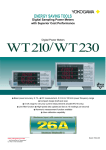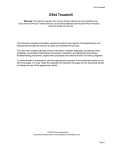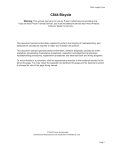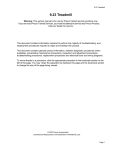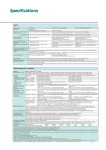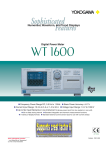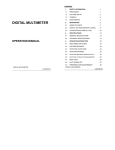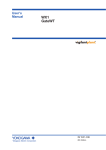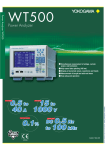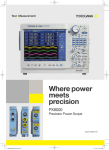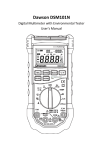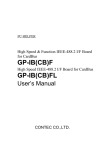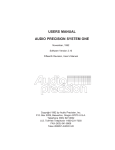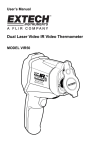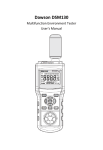Download Bulletin 7604-00E WT210/WT230 Digital Power Meters
Transcript
Digital Power Meters
Digital Sampling Power Meters with Superior Cost Performance
쏹 Low power measurement (IEC62301)
쏹 Harmonic measurement
쏹 Compact design (half-rack size)
쏹 Line filter function
쏹 User calibration capability
0.2%
±
Crest factor
6 at rated
www.yokogawa.com/tm/
Basic Power Accuracy
input
Frequency range
DC 0.5 Hz
to100 kHz
Low current (WT210)
5 mA range
Bulletin 7604-00E
Visit our website to sign up for email updates.
WT210/WT230 Digital Power Meters
WT210/WT230
The WT230’s advanced specifications and its wide range of functions let you handle all your measurement applications from low-frequency
equipment to three phase equipments using a single power meter.
One unit also handles standby low-power measurements and rated-power measurements (functions available with the WT210 only).
WT230
WT210
● Wide range of 5 mA to 20 A
The built-in 5 mA range lets you measure currents as low as 25 µA. This makes it possible to measure very
low currents on such things as intermittent control equipment. The wide current range (5 mA to 20 A) means a
single power meter can be used for applications such as Energy Star® measuremnts, to measure everything
from standby-power to rated-power.
Fr ee
Soft ware
WTViewer for the WT210/WT230
Easily Acquire and Manage Power
Measurement Data from Your PC
Power Consumption
Measurement
Software for IEC62301
Functions and Features of the WT210 and WT230
● A Wide Frequency Range Lets You Work on a Variety of Different Applications
LEDs
Low-frequency Equipment
0.2%
Commercial Power Supplies
Extended Energy Measurement Applications
0.1%
Maximum integration time: 10,000 hours 3
Low-frequency measurements starting at 0.5 Hz
Now you can obtain more precise
measurements on DC driven equipment such
as LEDs.
Low-frequency measurements starting at 0.5
Hz can be used with evaluations of
cycloconverter and when a motor are started.
● Powerful Tools for Energy Measurement
Power accuracy is even better than in former WT
series.
● Measurement According to
Each Standard
For Requirements for IEC and Other Standards
Battery equipment applications
Crest factor (CF) = 6 mode
Integrating power measurement by polarity
● Accuracy Is Assured between 1% and 130%
1: Maximum display is 140% of the rated input.
2: Conditions apply to accuracy from 110% to 130%.
1% input
This mode allows easy measurement using instruments for which
crest factors (CF) of 5 and above are required, as is so with most
standards including IEC62018.
Intermittent Control Equipment Applications
130% input
12
New
Average active power display3
26A
751552
With 751552 ➞ Max. 1000 Arms
● Capture a Variety of Signal Types
Surge current and maximum load state
Constantly changing signals
MAX hold function for voltage, current, and power 3
Quick response with display updating as fast as every 0.1 second
This function lets you keep, on the display, voltage and current peak
values, voltage and current rms values, and maximum values for active
power, apparent power, and reactive power.
● Applications for a Variety of Add-on Options
Large-current Measurement Using Current Clamps
Online Power Meter Control and Recording
Power Supply Harmonic Measurements
External input for current sensor
GP-IB/serial (RS-232-C) interface
Select either 50/100/200 mV or 2.5/5/10 V.
A current clamp lets you measure currents
without needing to disconnect the power supply
circuit wiring.
This option lets you control the power
meter through a PC, or save data to a
PC.
Calculate voltage, current, reactive power,
content ratio, and phase angle relative to
fundamental frequency for up to 50 orders. This
option is well-suited to power supply environment
evaluations. Measurement time is approximately
90% shorter than in former models.
Clamp
probe
With measurement intervals as short as 0.1 second, you can capture
transient phenomena with a fine level of detail. You can also reduce the
time per measurement for increased through put in production testing.
GP-IB/serial interface (RS-232-C)
External
input
D/A output
Half-wave Rectification, Intermittent Control, Distortion Waves
Measurement of DC components
In addition to using DC inputs, you can obtain precise measurements of
signals containing DC components, such as intermittent signals and halfwave rectification signals.
Comparator output
Noisy Signals
Line filter function (fc = 500 Hz)
This function lets you measure fundamental wave rms values for inverter
output voltages.
Instead of taking notes, you can use the internal memory to store and recall
settings and field measurement data.
Recording to a Recorder
GO/NO-GO Evaluations on Testing Lines
D/A output
4-channel comparator function
This option lets you output a variety of measurement
data, such as voltage, current, and power measurements,
with ±5 V rating, for recording on a recorder. The recorder
can then be used to check changes in data over time.
A 4-channel relay contact output (normal-open and normal-close pair) lets
you do GO/NO-GO evaluations on production and testing lines.
2
ScopeCorder
3: Popular functions on the WT200 were incorporated into WT210 and WT230.
Information on the features and functions of Yokogawa's WT210, WT230, accessories, and related products is also available at our web site. http://www.yokogawa.com/tm/
The specifications in facing pages are for crest factor 3 setting.
See page 5 for the specifications of crest factor 6 setting.
3
Basic Characteristics (for crest factor 3)
Example of Frequency-power Accuracy Characteristics
Example of WT210 Current Accuracy
10
Indicated value tolerance (% of reading)
10
Tolerance (% of range)
WT230 15 V/1 A range
Spec and reference values
5
0
-5
-10
0.1
1
10
100
1000
10000
100000
8
6
4
2
0
-2
-4
-6
100 mA range: 60 Hz input
-8
-10
0.1
1
Current Input Surge Withstanding Ability
5
300
WT230 150 V range
WT230 500 mA range
Spec and reference values
4
5 mA-20 mA range
0.5 A-20 A range
250
Tolerance (% of range)
Surge current value (Arms)
100
Example of Influence of Common Mode Voltage
350
200
150
100
3
2
1
0
50
0
0.01
10
Input level relative to set range (% of range)
Frequency (Hz)
-1
0.1
1
10
100
0.1
1
Input current time width (seconds)
Example of D/A Output Response
100
1000
10000
100000
Frequency (Hz)
Comparison with Former Models
Voltage input terminal
External input terminal
Voltage and current
basic accuracy
WT200/WT130
Binding post
Plug-in terminal (safety terminal)
WT210/WT230
Plug-in terminal (safety terminal)
BNC
0.25% of rng
0.2% of rng
Power basic accuracy
0.3% of rng (WT200)
0.35% of rng (WT130)
Frequency range
Assured accuracy range
Display updating interval
V, A, W display digits
DC, 10 Hz to 20 kHz
10% to 130% of range rating
0.25 second (fixed)
4 digits (WT130)
5 digits (WT200)
DC, 0.5 Hz to 100 kHz
1% to 130% of range rating
0.1/0.25/0.5/1/2/5 seconds
Line filter function
Frequency filter function
Key lock
No
Yes (fc = 300 Hz)
No
Yes (fc = 500 Hz)
Yes (fc = 500 Hz)
Yes
Approximately 3 seconds
0.25/0.5/1/2/5 seconds
Harmonic measurement display
updating interval
Remote signals when
comparator is installed
display update time
10
Online data format
Waveform data communications output
0.2% of rng
5 digits
All six signals listed to the left are added.
EXT HOLD and EXT TRIG are added. EXT START,
EXT STOP, EXT RESET, and INTEG BUSY are not added.
Pin assign is changed.
ASCII
No
ASCII, binary
Yes (need /HRM)
Addressable mode B for
GP-IB communications
Yes
No
Display digits (factory default)
Online output data digits (factory default)
4 digits
4 digits
5 digits
5 digits
Functions Included with the WT200 (but Not Included with the WT130) and Included with the WT210/WT230
• MAX hold function • Moving decimal point display based on integrated power value
• 10,000-hour maximum integration time • Integration with few data omissions • Average active power display
4
WT 230
WT 210
Specifications
The latest product information is available at our web site http://www.yokogawa.com/tm/. Review the specifications to determine which model is right for you.
Input Specifications
Parameter
Current
Voltage
Floating input
Input type
Resistance voltage divider
Shunt input system
Crest factor 3
15/30/60/150/300/600 V
Direct input:
Crest factor 6
7.5/15/30/75/150/300 V
Direct input:
Measuring instrument loss
(input resistance)
Input resistance: Approximately 2 MΩ
Input capacitance: Approximately 13 pF
Direct input: Approximately 500 mΩ + approximately 0.1 µH (5-200 mA3; WT210)
Approximately 6 mΩ + 10 mΩ (max)2 + approximately 0.1 µH (0.5-20 A4; WT210)
Approximately 6 mΩ approximately 0.1 µH (0.5-20 A; WT230)
External input: Approximately 100 kΩ (EX1:2.5/5/10 V5), approximately 20 kΩ (EX2:50/100/200 mV6)
Maximum instantaneous allowed input
(1 cycle, 20 ms duration)
Peak voltage of 2.8 kV or rms value of 2.0 kV (whichever is less)
Rated values
(ranges)
Maximum instantaneous allowed input
(1 second duration)
Maximum continuous allowed input
Maximum continuous common mode voltage
(with 50/60 Hz input)
Common mode rejection ratio (CMRR)
600 Vrms across input terminal and case
5/10/20/50/100/200 mA (WT210 only)1
; 0.5/1/2/5/10/20 A (WT210/WT230)
External input (optional): 2.5/5/10 V(EX1) or 50/100/200 mV(EX2)
2.5/5/10/25/50/100mA (WT210 only)1
; 0.25/0.5/1/2.5/5/10 A (WT210/WT230)
External input (optional): 1.25/2.5/5 V(EX1) or 25/50/100 mV(EX2)
0.5-20 A4 (WT210/WT230): Peak current of 450 A or rms value of 300 A (whichever is less)
5-200 mA3 (WT210): Peak current of 150 A or rms value of 100 A (whichever is less)
External input: Peak value of 10 times range or less
0.5-20 A4 (WT210/WT230): Peak current of 150 A or rms value of 40 A (whichever is less)
Maximum instantaneous allowed input
5-200 mA3 (WT210): Peak current of 30 A or rms value of 20 A (whichever is less)
(1 second duration)
External input: Peak value of 10 times range or less
Peak voltage of 2.0 kV or rms value of 1.5 kV (whichever is less) 0.5-20 A4 (WT210/WT230): Peak current of 100 A or rms value of 30 A (whichever is less)
5-200 mA3 (WT210): Peak current of 30 A or rms value of 20 A (whichever is less)
External input: Peak value of 5 times range or less
600 Vrms (with output connector protective cover), CAT II / 400 Vrms (without output connector protective cover) CAT II
50/60 Hz, -80 dB or higher (±0.01% of range or less) with voltage input terminals shorted and current input terminals open and external input terminals shorted
Note: The Maximum Range in the equation is 600 V,
20 A, 10 V(EX1), or 200 mV(EX2).
Reference value (up to 100 kHz): ±((Maximum range rating)/(Range rating) × 0.001 × f% of rng) or less (voltage range and 0.5-20 A current range and external
input range7)
±((Maximum range rating)/(Range rating) × 0.0002 × f% of rng) or less (WT210; 5-200 mA range)
Note: 0.01% or higher. f is in kHz. 7 Decuple the above-formula about the external input range.
Input terminal type
Plug-in terminal (safety terminal)
A/D converter
Simultaneous conversion of voltage and current inputs
Resolution: 16 bits
Maximum conversion speed: Approximately 20 µs (approximately 51 kHz)
Range switching
Ranges can be set manually, automatically, or through online controls.
Auto-range function
Range raising: When a measurement exceeds 130% of the rating, or when the peak value exceeds approximately 300%8 of the rating
Range lowering: When a measurement falls to 30% or less of the rating, and the peak value falls to approximately 300%8 or less of the rating for the low range
8, Approximately 600% for crest factor 6
Measurement mode switching
Any of the following, selected manually or through online controls: RMS (true rms value measurements for both voltage and current), V MEAN (calibration of
average-value-rectified rms value for voltage; true rms value measurement for current), DC (simple averages for both voltage and current)
Direct input: Large binding post
External input: BNC connector (insulation type)
Note: Current direct input and external sensor input cannot both be used at the same time. When you operate current input terminals and external input terminals, please be careful.
Since these terminals are electrically connected inside the instrument.
1, Connect wires that match the size of the measurement current. 2, Factory setting 3, 2.5 -100 mA for crest factor 6
4, 0.25-10 A for crest factor 6 5, 1.25/2.5/5 V for crest factor 6 6, 25/50/100 mV for crest factor 6
Measurement Functions
Parameter
Active power
Voltage/current
Digital sampling; sum of averages method
System
DC, and 0.5 Hz to 100 kHz
Frequency range
3 or 6 (with rated input) 300 (with minimum effective input)
Crest factor
Accuracy (three months after calibration)
(Conditions)
Temperature: 23±5°C
Humidity: 30-75% RH
Input waveform: Sinewave
Power factor: cosj = 1
common mode voltage: 0 V DC
Frequency filter: ON at 200 Hz or less
Scaling: OFF
Display digits: 5 digits
After CAL is executed
Crest factor 3
Note: In the accuracy calculation formula, f is in kHz.
DC:
0.5 Hz ≤ f < 45 Hz:
45 Hz ≤ f ≤ 66 Hz:
66 Hz < f ≤ 1 kHz:
1 kHz < f ≤ 10 kHz:
±(0.2%
±(0.1%
±(0.1%
±(0.1%
±((0.07
10 kHz < f ≤ 100 kHz:
±((0.5% of rdg + 0.5% of rng)
±((0.04 × (f-10))% of rdg)
DC:
0.5 Hz ≤ f < 45 Hz:
45 Hz ≤ f ≤ 66 Hz:
66 Hz < f ≤ 1 kHz:
1 kHz < f ≤ 10 kHz:
or rdg + 0.2% of rng)*
of rdg + 0.2% of rng)
of rdg + 0.1% of rng)
of rdg + 0.2% of rng)
× f)% of rdg + 0.3% of rng)
10 kHz < f ≤ 100 kHz:
±(0.3% or rdg + 0.2% of rng)*
±(0.3% of rdg + 0.2% of rng)
±(0.1% of rdg + 0.1% of rng)
±(0.2% of rdg + 0.2% of rng)
±(0.1% of rdg + 0.3% of rng)
±((0.067 × (f-1))% of rdg)
±(0.5% of rdg + 0.5% of rng)
±((0.09 × (f-10))% of rdg)
* Add ±10 µA × voltage reading to the power DC accuracy. (Note 1)
* Add ±10 µA to the current DC accuracy. (Note 1)
Power factor effect
For cosϕ = 0
45 Hz ≤ f ≤ 66 Hz: ±0.2% of VA (VA is a reading value of apparent power)
Reference data (up to 100 kHz): ±((0.2 + 0.2 × f)% of VA)
Indicated value tolerance for 0 < cosϕ < 1
Add (tanj ϕ (effect when cosj = 0)% of power reading to the above power accuracy.
Note: ϕ is the phase angle between voltage and current.
Note: In the accuracy calculation formula, f is in kHz.
Effective input range (Crest factor 3)
19 -130% of voltage/current range rating (for accuracy at 110-130%, add the reading tolerance × 0.5 to the above accuracy)
Accuracy (12 months after calibration)
Add the accuracy's reading tolerance (three months after calibration) × 0.5 to the accuracy three months after calibration.
Line filter function
A low-pass filter can be inserted in the input circuit for measurement. The cutoff frequency (fc) is 500 Hz.
Accuracy with line filter on
Voltage and current: Add 0.2% of rdg at 45-66 Hz. Add 0.5% of rdg below 45 Hz.
Power: Add 0.3% of rdg at 45-66 Hz, Add 1% of rdg below 45 Hz.
Accuracy (for crest factor 6)
Double the accuracy's range tolerance of the accuracy for crest factor 3.
±0.03% of range/°C at 5-18°C and 28-40°C.
Temperature coefficient
Display updating intervals
0.1/0.25/0.5/1/2/5 seconds
Lead/lag detecting
(Crest factor 3)
Measurement lower limit frequency
Lead/lag is detected correctly when phase angle equal to or greater than ±5° with both voltage and current inputs as sine waves equal to or greater than 50%10
of rated range-value, and the frequency is between 20 Hz to 2 kHz.
10, 100% for crest factor 6
rng: Range rdg: Reading
Data updating rate
Measurement lower limit frequency
9, 2 for crest factor 6
0.1 second
25 Hz
0.25 second
0.5 second
1 second
2 seconds
5 seconds
10 Hz
5 Hz
2.5 Hz
1.5 Hz
0.5 Hz
(Note 1) Guaranteed accuracy ranges for frequency, voltage and current(direct input)
All accuracy figures for 0.5 to 10 Hz are reference values. The accuracy figures for DC, 10Hz to 45Hz,
and 400Hz to 30kHz when the current exceeds 20A are reference values.
WT210: The maximum current input is 6A when the frequency is over 30kHz up to 100kHz.
Frequency Measurements
Measurement inputs: V1, V2, V3, A1, A2, or A3 (select one)
Measurement system: Reciprocal system
Measurement frequency ranges
100 ms: 25 Hz ≤ f ≤ 100 kHz
250 ms: 10 Hz ≤ f ≤ 100 kHz
500 ms: 5 Hz ≤ f ≤ 100 kHz
1 sec: 2.5 Hz ≤ f ≤ 100 kHz
2.5 sec: 1.5 Hz ≤ f ≤ 50 kHz
5 sec: 0.5 Hz ≤ f ≤ 20 kHz
Accuracy (1 year): ±(0.06% of rdg)
Conditions:
Input equal to at least 30%11 of voltage/current rated range.
Frequency filter function ON at 200 Hz and below.
11, 60% for crest factor 6
Frequency filter cutoff frequency: 500 Hz
Communication Functions (Optional for the WT210)
GP-IB or serial interface (RS-232-C) (select one)
GP-IB
Electrical and mechanical specifications:
Conform to IEEE Standard 488-1978 (JIS C1901-1987).
Functional specifications:
SH1, AH1, T5, L4, SR1, RL1, PR0, DC1, DT1, C0
Protocol:
Conforms to IEEE Standard 488.2-1992.
Code used:
ISO (ASCII) code
Addresses:
0-30 talker/listener addresses can be set.
Serial interface (RS-232-C)
Transmission mode: Asynchronous
Baud rates:
1200, 2400, 4800, 9600 bps
5
Specifications
Calculation Functions
Internal Memory Functions
Single- Three-phase 3-wire Three-phase 3-wire
phase 3- (2 voltages,
(3 voltages,
wire
2 currents)
3 currents)
Voltage ∑V
(V1 + V3)/2
(V1 + V2 + V3)/3
Current ∑A
(A1 + A3)/2
(A1 + A2 + A3)/3
Active power ∑W
Reactive
power
var, ∑var
Apparent
power
VA, ∑VA
Power
factor PF,
∑PF
Phase
angle deg,
∑deg
W1 + W3
Threephase 4wire
W1 + W2 + W3
vari = (VA2 - W2) var1 + var3
var1 + var2 + var3
VAi = Vi × Ai
VA1 + VA3
Pfi = Wi/VAi
∑W/∑VA
degi =
cos-1 (Wi/VAi)
cos-1 (∑W/∑VA)
3
2
(VA1 + VA3)
3
3
(VA1 + VA2 + VA3) VA1 + VA2 + VA3
Notes
1. This equipment's apparent power (VA), reactive power (var), power factor (PF),
and phase angle (deg) are calculated from voltage, current, and active power.
(Therefore, if the input contains a distorted wave, the values may not match those
of other measuring instruments based on different measurement principles.)
2. If either voltage or current falls to 0.5%(for crest factor 3. 1.0% for crest factor 6) of
the range rating or less, then the apparent power (VA) and reactive power (var) are
displayed as zero, and errors are displayed for power factor (PF) and phase angle
(deg).
3. The sign of the var of each phase is displayed with +(positive). In the ∑var
calculation, the var value for each phase is calculated with a negative sign if the
current input leads the voltage input, and with a positive sign if the current input
lags the voltage input. Then the value of ∑ var may be displayed with –(negative).
4. Apparent power (VA) and reactive power (var) cannot be calculated and displayed
at the harmonics measurement mode.
Display Functions
Display unit:
Display areas:
7-segment LED (light-emitting diode)
3
Display area
Displayed information
A
V, A, W, VA, var (for each element), integration elapsed time
B
V, A, W, PF, deg (for each element, percentage (content percentage, THD)
C
V, A, W, V/AHz, Vpk, Apk, ±Wh, ±Ah (for each element), MATH
Measurement parameters Maximum display
V, A, W, VA, var
Display resolution
99999
0.001%
PF
±1.0000
0.01%
deg
±180.0
0.1*
±Wh, ±Ah
999999
0.0001%
VHz, AHz
99999
Input frequency/20,000
Display digits: 4 or 5 digits (selectable by user).
Factory default setting is 5 digits.
Units:
m, k, M, V, A, W, VA, var, Hz, h±, deg, %
Display updating intervals: 0.1/0.25/0.5/1/2/5 seconds
Response time:
Maximum 2 times the display updating interval (time required
for display value to enter accuracy range of final value with line
filter off, when range rating abruptly changes from 0% to 100%,
and from 100% to 0%)
Maximum display:
140% of voltage/current range rating
Minimum display:
About Vrms, Arms, Vmean and Ah
0.5% of range rating (for crest factor 3)
1% of range rating (for crest factor 6)
Less than 0.5% is zero suppression.
Display scaling function
Effective digits: Selected automatically according to the digits in the voltage and
current ranges.
Setting range:
0.001 to 9999
Averaging function
Methods:
Exponential average or moving average
Exponential average: Attenuation constant of 8, 16, 32, or 64
Moving average: Number of averages set to 8, 16, 32, or 64
Auto-range monitor
An LED turns on when the input value is outside the range set for the auto-range.
MAX hold function
This function can be used to hold V, A, W, VA, var, Vpk, and Apk at maximum values.
MATH functions
System:
When a function key on DISPLAY C is pressed to select the
MATH functions, it is possible to perform efficiency (WT230 only)
and input crest factor measurements, as well as arithmetic
calculations on DISPLAY A and B measurements. In addition, it
is possible to display average active power for time-converted
integrated power.
Measurement data
Stored data
Normal measurement Harmonic measurement
WT210 (760401)
Data for 600 samples
Data for 30 samples
WT230 (760502)
Data for 300 samples
Data for 30 samples
WT230 (760503)
Data for 200 samples
Data for 30 samples
Store interval:
Display updating interval and 1 second to 99 hours, 59 minutes,
and 59 seconds
Recall interval: Display updating interval and 1 second to 99 hours, 59 minutes,
and 59 seconds
(Both can be set in 1-second increments.)
Panel setting information: Four different patterns of panel setting information can be written/
read.
Harmonic Measurement Function (/HRM Option)
System:
PLL synchronization
Measurement frequency range:
Fundamental frequency in range of 40-440 Hz
Maximum display:
99999
Display digits:
4 or 5 digits (selectable by user).
Factory default setting is 5 digits.
Measurement parameters: V, A, W, deg (WT210), V1, V2, V3, A1, A2, A3, W1, W2,
W3, deg1, deg2, deg3 (WT230), individual harmonic levels, rms
voltage, rms current, active power, fundamental frequency PF,
harmonic distortion rate, individual harmonic content
Measurement element: These parameters can only be measured simultaneously for
a single specified input element.
Sampling speed, window width, and analysis orders
The values for these parameters vary according to the input fundamental frequency
as shown below.
Fundamental frequency
Sampling speed
Window width
Analysis orders
40 ≤ f < 70 Hz
f × 512 Hz
2 periods of f
50
70 ≤ f < 130 Hz
f × 256 Hz
4 periods of f
50
130 ≤ f < 250 Hz
f × 128 Hz
8 periods of f
50
250 ≤ f ≤ 440 Hz
f × 64 Hz
16 periods of f
30
FFT data length:
1024
FFT processed word length: 32 bits
Window function:
Rectangular
Display updating interval:
0.25/0.5/1/2/5 seconds Updating is slower during online output
according to the communication speed and the number of
parameters transferred.
Accuracy:
Add ±0.2% of range to normal measurement accuracy.
Note:
For nth-order component input, add {10/(m+1)} % of
the nth-order reading to the n+mth order and n-mth order.
D/A Output (/DA4 or /DA12 Option)
Output voltage:
±5 V FS (maximum approximately ±7.5 V) for each rated value
Number of outputs: 12 parameters with /DA12 option; 4 parameters with /DA4 option
Output data selection: Can be set separately for each channel.
Accuracy:
±(equipment accuracy + 0.2% of FS)(FS=5 V)
D/A converter:
12-bit resolution
Response time:
Maximum 2 times the display updating interval
Updating interval:
Same as the equipment's display updating interval
Temperature coefficient:
±0.05%˚C of FS
Output type
Frequency
D/A output
7.5V
5.0V
2.5V
0.5V
0 0.5Hz 1Hz
10Hz
100Hz
Maximum display:
Modes:
Timer:
Count over flow:
Accuracy:
Timer accuracy:
Remote control:
The minimum display resolution changes together with the
integrated value.
-99999 to 999999 MWh/MAh
Standard integration mode (timer mode), continuous integration
mode (repeat mode), manual integration mode
Automatic integration start/stop based on timer setting.
Setting range: 000 h:00 min:00 sec to 10000 h:00 min:00 sec
(If the time is set to zero, manual mode is automatically set.)
When the integrated value exceeds 999999 MWh/MAh or falls
to at least -99999 MWh/MAh, the elapsed time is saved and the
operation is stopped.
±(display accuracy + 0.1% of rdg)
±0.02%
Starting, stopping, and resetting can be controlled through
external contact signals. This function is only available when
option /DA4, /DA12 or /CMP is installed.
10kHz 100kHz Display value
Integration
D/A output
7.0V
For input equal to 140% of rating
5.0V
Integration Functions
Display resolution:
1kHz
For rated input
0
t0
t0: Rated setting time
Other parameters
D/A output
Display
140%
100%
0%
-100%
-140%
Output
7.0V
5.0V
0V
-5.0V
-7.0V
Note: For PF and
deg, there is no
output between ±5
and ±7 V. When an
error occurs,
approximately 7.5 V
are output.
7.5V
7.0V
5.0V
-140% -100%
Display value
0V
100% 140%
-5.0V
-7.0V
-7.5V
6
Integration time
■ Model Numbers and Suffix Codes
External Input (/EX1 or EX2 Option)
Select either /EX1 or /EX2 for the voltage output-type current sensor.
/EX1:
2.5/5/10 V
/EX2:
50/100/200 mV
Specifications:
See the section on input specifications.
Suffix code
Model number
Description
760401
WT210 single-input element model
Power cord -D
Comparator Output (/CMP Option)
Output method:
Normal-open and normal-close relay contact output (pair)
Number of output parameters and settings:
Four parameters; can be set separately on each output channel.
Contact capacitance: 24 V/0.5 A
D/A output (4-channel): See section on D/A output (optional)
UL/CSA standard
-F
VDE standard
-R
AS standard
-Q
BS standard
-H
GB standard
Options
External Control Signal (with /DA or /CMP Option Only)
External control signals:EXT-HOLD, EXT-TRIG, EXT-START, EXT-STOP, EXT-RESET,
INTEG-BUSY
Input:
TTL level negative pulse
/C1
GP-IB communication interface
/C2
Serial (RS-232-C) communication interface
Select one
/EX1
External input 2.5/5/10 V
/EX2
External input 50/100/200 mV
/HRM
Select one
Harmonic measurement function
/DA4
Select one
4-channel DA output
/CMP
Comparator and D/A, 4 channels each
Note: The WT210 communication interface cannot be changed or modified after delivery.
General Specifications
Warmup time:
Approximately 30 minutes
Operating temperature and humidity ranges: 5-40˚C, 20-80% RH (no condensation)
Storage temperature: -25-60˚C (no condensation)
Maximum operating elevation: 2000 meters
Insulating resistance: 50 MΩ or higher at 500 V DC across all of the following areas:
Voltage input terminals (ganged) and case
Current input terminals (ganged) and case
Voltage input terminals (ganged) and current input terminals
(ganged)
Voltage input terminals (ganged) of each element
Current input terminals (ganged) of each element
Voltage input terminals (ganged) and power plug
Current input terminals (ganged) and power plug
Case and power plug
Insulating withstand voltage:
3700 V for one minute at 50/60 Hz across all of the following
areas:
Voltage input terminals (ganged) and case
Current input terminals (ganged) and case
Voltage input terminals (ganged) and current input terminals
(ganged)
Voltage input terminals (ganged) of each element
Current input terminals (ganged) of each element
Voltage input terminals (ganged) and power plug
Current input terminals (ganged) and power plug
1500 V for one minute at 50/60 Hz across case and power plug
Power supply:
Free power supply (100-240 V), 50/60 Hz frequency
Consumed power: Max 35 VA for WT210, max 55 VA for WT230
External dimensions for WT210:
Approximately 213 × 88 × 379 mm (WHD) (excluding projections)
External dimensions for WT230:
Approximately 213 × 132 × 379 mm (WHD) (excluding
projections)
Weight:
Approximately 3 kg for WT210, approximately 5 kg for WT230
Safety standard
Complying standard EN61010-1
Overvoltage category (Installation category) II
Pollution degree 2
Emission
Complying standard EN61326 Class A
EN61000-3-2
EN61000-3-3
AS/NZS 2064 Class A
Immunity
Complying standard EN61326 Annex A
Suffix code
Model number
Description
760502
WT230 2-input element model
760503
WT230 3-input element model
Interface -C1
Power cord
Select one
GP-IB communication interface
-C2
Serial (RS-232-C) communication interface
-D
UL/CSA standard
-F
VDE standard
-R
AS standard
-Q
BS standard
-H
Options
GB standard
Select one
/EX1
External input 2.5/5/10 V
/EX2
External input 50/100/200 mV
/HRM
Harmonic measurement function
Select one
/DA12
12-channel DA output
/CMP
Comparator and D/A, 4 channels each
■ Standard Accessories
Power cord, Power fuse, Current input protective cover, Rubber feet for the hind feet,
24-pin connector (provided only on options/DA4, /DA12, and /CMP), User’s manual
When using the WT210/WT230 with WTViewer (for the WT210/WT230) for waveform
display on the PC screen or harmonic measurement, the /HRM option must be installed
on the WT210/WT230.
■ Rack mounts
Product
Model or part number
Specification
Order quantity
Rack mounting kit
751533-E2
For WT210 EIA standalone installation
1
Rack mounting kit
751533-J2
For WT210 JIS standalone installation
1
Rack mounting kit
751534-E2
For WT210 EIA connected installation
1
Rack mounting kit
751534-J2
For WT210 JIS connected installation
1
Rack mounting kit
751533-E3
For WT230 EIA standalone installation
1
Rack mounting kit
751533-J3
For WT230 JIS standalone installation
1
Rack mounting kit
751534-E3
For WT230 EIA connected installation
1
Rack mounting kit
751534-J3
For WT230 JIS connected installation
1
Ask Yokogawa for information on rack mounts in which WT210 and WT230 are combined.
■ Exterior View
■ Accessories (sold separately)
Unit : mm
73
359
356
23
Model number
Description
B9317WD
1.5 mm hex wrench
For fastening cable on 758931
B9284LK
External sensor cable
For external input; 50 cm
88
250
213
179
waveform peak
19
Note:Crest Factor
WT210
13
23
213
327
The crest factor is the ratio of the waveform
peak value and the RMS value.
34
28.5
Crest factor (CF, peak factor) =
waveform peak
RMS value
132
About the measurable crest factor of our power measuring instruments, please refer
to the following equation.
Crest factor (CF) =
21
WT230
■ Wiring Types and Model Numbers
Model
760401
760502
760503
Single-phase 2-wire
✓
✓
✓
Single-phase 3-wire
–
✓
✓
Three-phase 3-wire (2 voltages, 2 currents)
–
✓
✓
Three-phase 3-wire (3 voltages, 3 currents)
–
–
✓
Three-phase 4-wire
–
–
✓
Wiring
RMS value
{measuring range x CF setting (3 or 6)}
measured value (RMS)
* However, the peak value of the measured signal must be less than or equal to the
continuous maximum allowed input.
* The crest factor on a power meter is specified by how many times peak input
value is allowed relative to rated input value. Therefore, even if some measured
signals exist whose crest factors are larger than the specifications of the
instrument (the crest factor standard at the rated input), you can measure signals
having crest factors larger than the specifications by setting a measurement
range that is large relative to the measured signal.
For example, even if you set CF = 3, CF5 or higher measurements are possible if
the measured value (RMS) is 60% or less than the measuring range. Also, for a
setting of CF = 3, measurements of CF = 300 are possible with the minimum
effective input (1% of measuring range).
* Crest factor 6 is supported by the WT210/WT230 of firmware versions 1.11 and
later.
7
Related Products
758917
758922
758929
758923
758931
B9284LK
Measurement leads
Small alligator adapters
Large alligator adapters
Safety terminal adapter set
Safety terminal adapter set
External sensor cable
Two leads in a set. Use 758917 in
combination with 758922 or 758929.
Total length: 75 cm
Rating: 1000 V, 32 A
For connection to measurement leads
(758917). Two in a set.
Rating: 300 V
For connection to measurement leads
(758917). Two in a set.
Rating: 1000 V
(spring-hold type) Two adapters in a
set.
Screw-fastened adapters. Two
adapters in a set. 1.5 mm Allen
wrench included for tightening.
For the external input of the WT210
and WT 230.
Length: 50 cm
Current Sensor
Current Transducer
■ For Wide range & high precision(0.05% + 30 µA)
Clamp on Probe
■ For high-current measurements up to 1000 Arms
■ For high precision (0.05% + 40 µA)
CT60/CT200/CT1000 Current Sensors 751574 Current Transducer
751552 Clamp on Probe
758917
Measurement leads
758921
Fork Terminal Adapter
● DC~800 kHz/60 Apk, DC~500 kHz/200 Apk, DC~300 kHz/1000 Apk
● Wide dynamic range: ±0-1000 A (DC)/1000 A peak (AC)
● Wide measurement frequency range: DC and up to 800 kHz
● High-precision fundamental accuracy: ±(0.05% of reading + 30 µA)
● ±15 V DC power supply, connector, and load resistor required.
For detailed information, see Current Sensors& Accessories Catalog
Bulletin CT1000-00E.
● Wide measurement frequency range: DC and up to 100 kHz (-3 dB)
● High-precision fundamental accuracy: ±(0.05% of reading + 40 µA)
● Wide dynamic range: 0-600 A (DC)/600 A peak (AC)
● ±15 V DC power supply, connector, and load resistor required.
● Measurement frequency range: 30 Hz to 5 kHz
● Basic accuracy: 0.3% of reading
● Maximum allowed input: AC 1000 Arms, max 1400 Apk (AC)
● Current output type: 1 mA/A
For detailed information, see Power Meter Accessory Catalog Bulletin
7515-52E.
CT series do not conform to CE Marking.
A separately sold fork terminal adapter set (758921), measurement
leads (758917), etc. are required for connection to WT210/WT230. For
detailed information, see Power Meter Accessory Catalog Bulletin 751552E.
Due to the nature of this product, it is possible to touch its metal parts. Therefore, there is a risk of electric shock, so the product must be used with caution.
Free Application Software
WTViewer for the WT210 and WT230
Power Consumption
Measurement Software
Meets the requirement of IEC62301, household electrical appliances - Measurement of
Standby Power
LabVIEW* Driver Software (Free)
Download this software program from our web
site.
Easily Acquire and Manage Power Measurement Data form Your PC
WTViewer for the WT210/WT230 is a software application that allows you to load numeric
and waveform data measured with the WT210 or WT 230 Digital Power Meter to a PC via
GP-IB or serial (RS-232-C) communications.
Visit our web site to register your product and download this software
program.
http://www.yokogawa.com/tm/WT210/
* LabVIEW is a registered trademark of National
Instruments Corporation.
See our web site or the software catalog (Bulletin 7604-32E) for detailed specifications.
Information on the features and functions of Yokogawa’s WT series & PZ, accessories, and related products is also available at our homepage. http://www.yokogawa.com/tm/
Protecting the global environment
Yokogawa's products are developed and produced in facilities that have received
ISO14001 approval.
CAUTION
YOKOGAWA METERS & INSTRUMENTS CORPORATION
Global Sales Dept. /Phone: +81-42-534-1413 Facsimile: +81-42-534-1426
E-mail: [email protected]
YOKOGAWA CORPORATION OF AMERICA Phone: (1)-770-253-7000, Fax: (1)-770-254-0928
YOKOGAWA EUROPE B.V.
Phone: (31)-88-4641000, Fax: (31)-88-4641111
YOKOGAWA ENGINEERING ASIA PTE. LTD. Phone: (65)-62419933, Fax: (65)-62412606
Read the user's manual carefully for correct and safe use of the
instrument.
Subject to Change without notice.
Copyright©2002 Yokogawa Electric Corporation.
[Ed : 05/b]
Printed in Japan, 305(KP)







